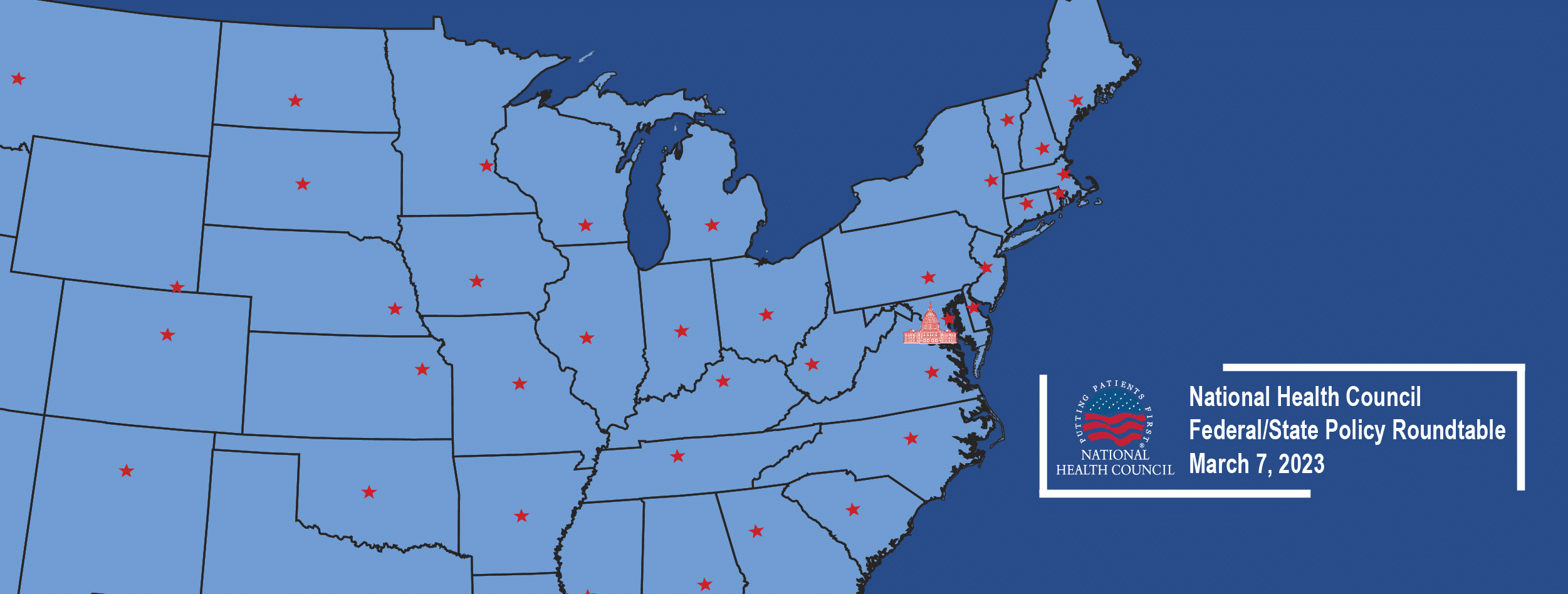

Inaugural Roundtable Explores the Intersection of Federal and State Health Policy
By: Allen Pinn, Policy Coordinator
On March 7, 2023, the National Health Council (NHC) hosted its first Federal-State Policy Roundtable, which was attended by nearly 80 federal and state policy staff from NHC member organizations across the country.
Below is a summary of the presentations, panel discussions, and breakout sessions.
State Health Politics & Policy and the Intersection with Federal Health Policy
Kelly Hughes, Associate Director, at the National Council of State Legislatures (NCSL), led the first session of the Roundtable. During her presentation, Hughes highlighted pertinent issues such as the shortage in the health care workforce, behavioral health, and maternal health. Also in her remarks, Hughes touched upon Medicaid unwinding. Due to states needing to balance their budgets annually and the end of the COVID-19 Public Health Emergency, Medicaid unwinding will be a significant issue discussed in state legislatures. According to the NCSL, more than 2,000 bills related to Medicaid have been introduced in state legislatures across the country this year. As the Medicaid continuous requirement provision is scheduled to end April 1, which may result in nearly 4 million people becoming uninsured, states are looking to improve health insurance outreach and enrollment in response. States have also taken steps to leverage the Medicaid program to address maternal and child health. Many states have expanded or are planning to expand coverage from six to 12 months. Other trends highlighted by Hughes included utilization management, pharmacy benefit manager transparency, and the opioid crisis.
Reactor Panel of NHC Members
Moderated by Eric Gascho, NHC Senior Vice President, Policy and Government Affairs, the panel included Anna Hyde, Vice President of Advocacy and Access, at the Arthritis Foundation and Jennifer Rosen, Senior Director, State Affairs at the Alzheimer’s Association who shared their reactions to the state policy trends shared in the previous session and give an overview of their state teams’ top 2023 priorities. Both panelists emphasized the importance of access to care and prescription drugs, which has been exacerbated by the pandemic. Another key insight from the panelists was their agreement that issues in the United States health care system should be addressed more holistically, due to the interconnectedness of issues.
Key Takeaways from Breakout Sessions
Roundtable participants were divided into small, facilitated breakout groups to share their perspectives on the previous sessions and key issues facing their organizations. The most significant issues highlighted across the breakout sessions were Medicaid unwinding, Medigap plans, telehealth, workforce shortages, the impact of the Dobbs decision on all health outcomes, and health care coverage, access, and affordability.
NHC Member Panel on Operations
Moderated by Jennifer Dexter, NHC Vice President, Policy, the Member Panel on Operations included Lucy Culp, Executive Director, State Government Affairs at the Leukemia & Lymphoma Society; Lynn Albizo, Vice President of Public Policy at the Immune Deficiency Foundation; and Jamie Sullivan, Senior Director of Public Policy at EveryLife Foundation for Rare Diseases. The panelists discussed a range of topics including managing grassroots, prioritizing resources, sharing research and information, and communicating issues between the state and federal decision makers. Regarding the organizations’ sizes, the panelists all differed in the structure of their organizations, which gave Roundtable participants multiple outlooks on how an organization can run. For example, the Immune Deficiency Foundation is so small, they usually focus their efforts only on certain states at a time, which drastically differs from organizations such as the Leukemia & Lymphoma Society.
Key Takeaways from Breakout Sessions
For a second time, Roundtable participants divided into breakout groups to share their thoughts and experiences on building high-functioning federal and state government affairs structures. Major takeaways from these breakout sessions were: Leveraging regional policy councils, the value of partnerships, gathering information at the state level, including each organization’s constituencies in advocacy, and sharing the workload among organizations.
For a full summary of the event, please click here.


